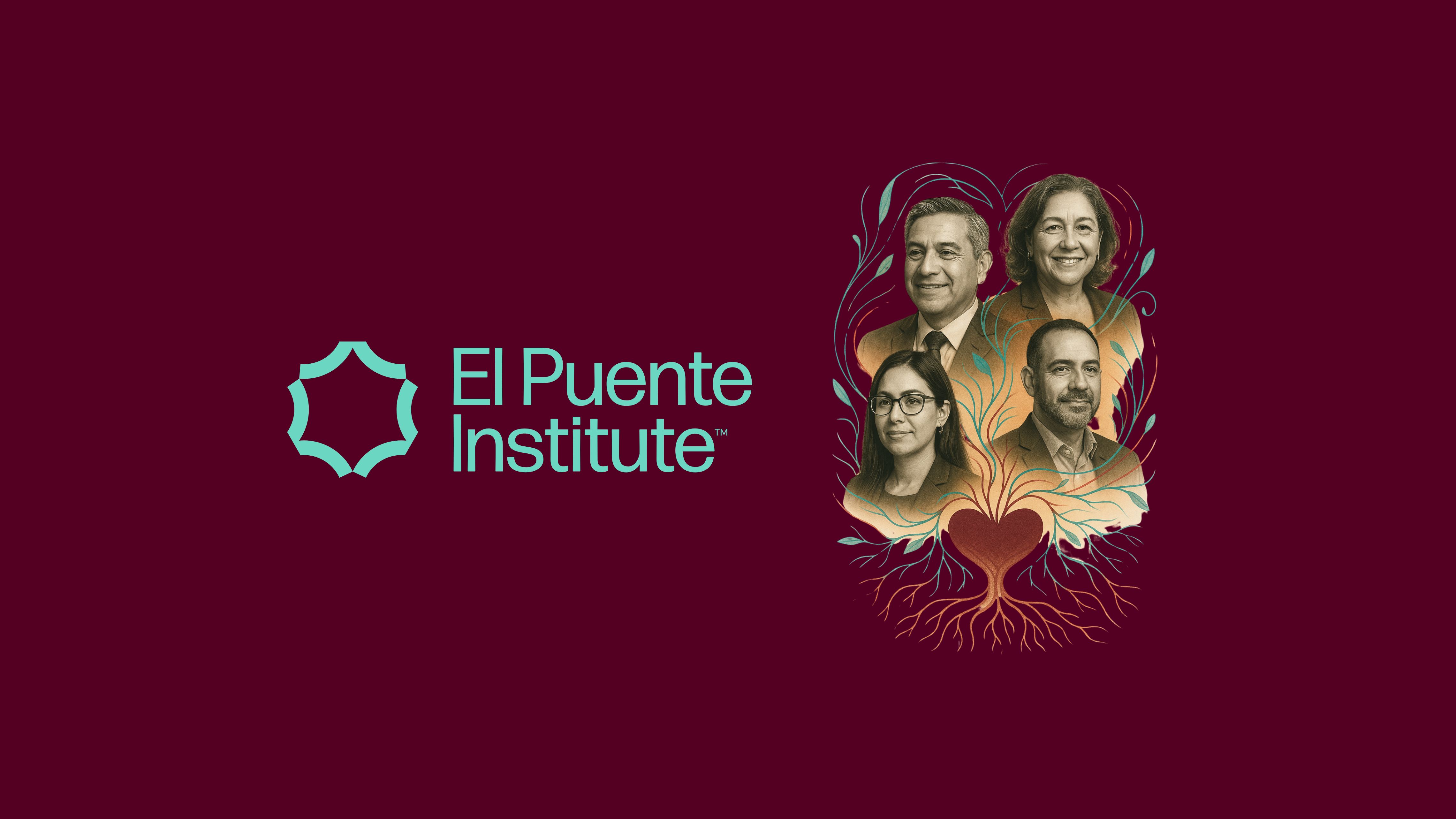In a world that prizes productivity, efficiency, and results, the greatest leadership challenge today is not technical; it’s relational.
Organizations are realizing that strategy alone doesn’t create trust, and performance metrics don’t sustain people through uncertainty. What sustains teams, communities, and movements is leaders who know how to connect those who lead with empathy, warmth, and genuine regard for others.
At El Puente Institute, we believe Latino leaders have carried this wisdom for generations. Our way of leading has always been deeply relational rooted in two enduring cultural scripts: personalismo and simpatía.
These are more than traits of friendliness or charm. They are ancestral codes of connection, shaped through centuries of resilience, survival, and transformation.
They are how we lead others with corazón, dignidad, and a belief that humanity belongs at the center of leadership.
The Roots of Relational Culture
The origins of personalismo and simpatía are layered and complex, emerging from the intersection of Indigenous, African, and Spanish-Catholic traditions during the colonial era.
✦ Indigenous Roots: Harmony and Relational Balance
Long before colonization, Indigenous communities across the Americas lived by values of reciprocity, interdependence, and collective care. Social harmony and respectful communication were essential to maintaining a healthy community life. These teachings formed the foundation for what we now recognize as simpatía, the practice of maintaining positive connection, harmony, and relational grace.
Similarly, Indigenous traditions emphasized being in right relation valuing each person’s dignity and spirit. This mirrors what we now call personalismo: a deep respect for the person, not just the position they hold.
✦ Spanish-Catholic Influence: Dignity and Courtesy
Spanish culture introduced Catholic moral frameworks centered on charity, humility, and the sacredness of the human person. The social codes of urbanidad y buenas maneras (civility and good manners) reinforced outward expressions of respect and warmth. When these blended with Indigenous ethics, they transformed courtesy and kindness from mere politeness into moral imperatives.
✦ African Influence: Joy, Emotional Warmth, and Communal Connection
The African diaspora contributed expressive joy, rhythm, and a deep sense of communal empathy. Through music, storytelling, and shared laughter, these traditions infused emotional vitality into Latino life. What became simpatía also carried the soulful warmth of African communal life the belief that our emotional presence with one another is part of our humanity.
Together, these influences created relational codes that were both adaptive and resistant ways to maintain dignity and solidarity in societies built on hierarchy and exclusion.
“Where power is divided, relationships become the only safe currency.”
Cultural Scripts as Strategies of Survival
During colonization, open resistance could be punished, but relational intelligence became a subtler, enduring form of power. Personalismo and simpatía allowed people to navigate oppressive systems while preserving humanity and trust.
They became cultural armor — soft power wrapped in warmth.
Across generations, these scripts helped Latinos sustain connection, build trust, and maintain belonging even amid displacement, migration, and marginalization. They endure today in every abuela’s consejo, every “¿Cómo estás, mijo?”, every act of hospitality and care that affirms our shared dignity.
The Leadership Code Hidden in Our Latino Culture
Today, the same relational scripts that once ensured survival have evolved into a distinct model of Latino leadership one rooted in authenticity, connection, and care.
- Personalismo reminds us to lead through relationships rather than roles. It calls us to see people as whole human beings, not just titles or tasks.
- Simpatía invites us to lead with emotional intelligence, kindness, and grace. It’s not about avoiding conflict; it’s about resolving it without losing respect or humanity.
In a time when many leaders are rediscovering the importance of empathy and belonging, these cultural scripts offer a timeless roadmap. They remind us that leadership begins not with authority, but with relationship.
When Latino leaders enter a room, we bring this ancestral wisdom with us, an intuitive understanding that trust is built before influence and that community is the most accurate measure of success.
Why We Still Keep Them
We keep personalismo and simpatía because they work. They are not sentimental; they are strategic.
They allow us to lead in ways that heal rather than harm, unite rather than divide. They ground our leadership in care, respect, and authenticity. They are how we build familia in boardrooms, classrooms, and communities.
Most importantly, they help us remember who we are, leaders shaped by community, sustained by faith, and guided by love.
Looking Ahead
At El Puente Institute, we believe the future of leadership is deeply relational and culturally grounded. As Latinos continue to shape workplaces, education, and civic life, the wisdom of our ancestors, the warmth of simpatía, and the dignity of personalismo will redefine what effective, ethical leadership looks like.
Because when we lead with corazón, we lead with history, community, and purpose.
To explore how these cultural scripts influence your own leadership, take the Cultural Drivers™ Profile Assessment, a reflective leadership development tool developed by El Puente Institute to help you understand the values that guide your decisions, relationships, and leadership style.
Discover your roots. Lead with your razón. Learn more at www.elpuenteinstitute.com










